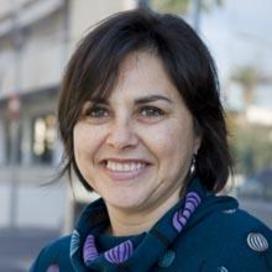
Carmen Fernández
Associate Research Professor Malaria and Neglected Parasitic DiseasesIn 1996 she received a Ph.D. in Biological Sciences from the Univ. of Granada. Later, she moved to Brazil (Univ. of Sao Paulo), where she did her first post-doctotal training, working on biological aspects of Plasmodium vivax. In 1998,she joined the ZMBH (Heidelberg) where she did her second postdoctoral stay working with Toxoplasma gondii. In 2000, she moved back to the Univ. of Sao Paulo as a Research Associated Fellow to continue her studies on P. vivax. In 2007, she joined ISGlobal's research centre in the program of malaria.
Lines of research
- Function and localization of variant proteins in P. vivax. In the absence of an effective continuous in vitro culture system for blood stages and reverse genetics, functional gene discovery in P. vivax is presently undoable. They explore the use of heterologous transfection of Vir proteins in P. falciparum to determine vir function.
- Antigen discovery for vaccine development in P. vivax malaria. The interest lies in identifying new antigens exported to the surface of infected reticulocytes through tolerization and subsequent immunizations with P. vivax infected reticulocytes. The aim is to determine which antigen(s) correlate with acquired immunity and clinical protection for furthering vaccine development against this parasite.
- Establishment of a continuous culture system for blood stages of P. vivax. Recently, the use of hematopoietic stem cells and addition of specific factors, which drove their differentiation into reticulocytes, represented a major improvement as it provided a constant source of reticulocytes, albeit in low percentages, to develop a continuous culture system. Using this information, they try to establish a continuous P. vivax culture system by immortalizing nucleated human hematopoietic stem cells.
Main publications
- Fernandez-Becerra C, Sanz S, Brucet M, Stanisic DI, Alves FP, Camargo EP, Alonso PL, Mueller I, del Portillo HA. Naturally-acquired humoral immune responses against the N- and C-termini of the Plasmodium vivax MSP1 protein in endemic regions of Brazil and Papua New Guinea using a multiplex assay. Malar. J. 2010;9:29.
- Fernández-Becerra C, Pinazo MJ, González A, Alonso PL, del Portillo HA, Gascón J. Increased expression levels of the pvcrt-o and pvmdr1 genes in a patient with severe Plasmodium vivax malaria. Malar. J. 2009;8:55.
- Carlton JM, Adams JH, Silva JC, Bidwell SL, Lorenzi H, Caler E, Crabtree J, Angiuoli SV, Merino EF, Amedeo P, Cheng Q, Coulson RM, Crabb BS, Del Portillo HA, Essien K, Feldblyum TV, Fernandez-Becerra C, Gilson PR, Gueye AH, Guo X, Kang'a S, Kooij TW, Korsinczky M, Meyer EV, Nene V, Paulsen I, White O, Ralph SA, Ren Q, Sargeant TJ, Salzberg SL, Stoeckert CJ, Sullivan SA, Yamamoto MM, Hoffman SL, Wortman JR, Gardner MJ, Galinski MR, Barnwell JW, Fraser-Liggett CM. Comparative genomics of the neglected human malaria parasite Plasmodium vivax. Nature. 2008 Oct 9;455(7214):757-763.
- Fernandez-Becerra C, Pein O, de Oliveira TR, Yamamoto MM, Cassola AC, Rocha C, Soares IS, de Bragança Pereira CA, del Portillo HA. Variant proteins of Plasmodium vivax are not clonally expressed in natural infections. Mol. Microbiol. 2005 Nov;58(3):648-658.
- del Portillo HA, Fernandez-Becerra C, Bowman S, Oliver K, Preuss M, Sanchez CP, Schneider NK, Villalobos JM, Rajandream MA, Harris D, Pereira da Silva LH, Barrell B, Lanzer M. A superfamily of variant genes encoded in the subtelomeric region of Plasmodium vivax. Nature. 2001 Apr 12;410(6830):839-842.




